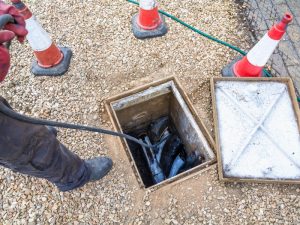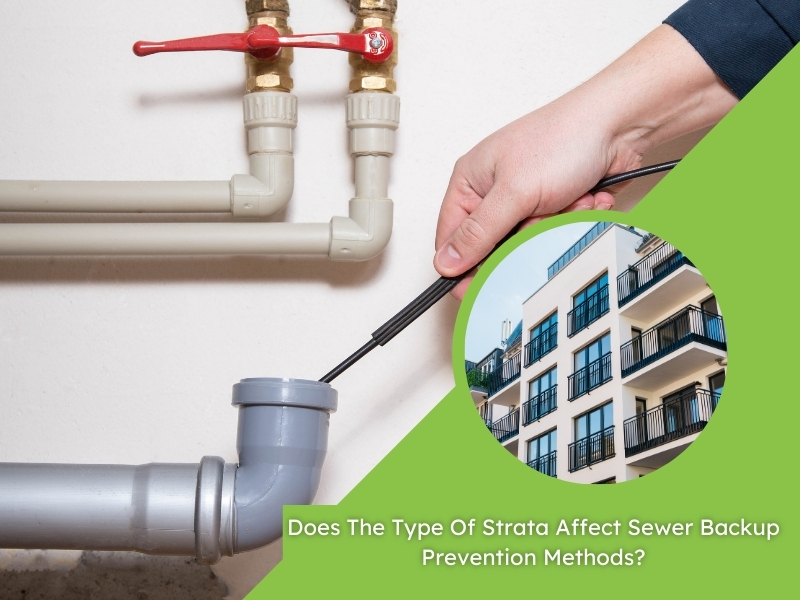Sewer backups are an unpleasant reality that can wreak havoc on residential and commercial properties. The severity of the problem and the prevention solutions often depend on the type of building involved, especially in strata properties, where ownership and maintenance responsibilities are shared. This article explores how different strata types can influence sewer backup prevention methods and what you can do to safeguard your property, whether it’s residential, commercial, or mixed-use strata.
What is sewer backup, and why is it concerned for strata properties?
A sewer backup occurs when wastewater flows in the opposite direction and re-enters a building through drains. This can happen due to blockages, broken pipes, or external factors like tree roots invading pipes. Sewer backups are not just inconvenient—they pose serious health risks. They can lead to costly damage to property and infrastructure.
The problem is more complex for strata properties. Shared plumbing systems mean a blockage or issue in one unit can easily affect others, making prevention essential, especially when several units rely on the same infrastructure.
How does strata type influence sewer backup prevention?
The type of strata can significantly impact the risk of sewer backup and the appropriate prevention methods. Here are some key factors to consider:
- Shared responsibilities: In strata properties, owners share responsibility for maintaining common areas, including the plumbing system.
- Usage patterns: Residential and commercial strata have different water usage patterns, affecting the type of prevention methods needed.
- Maintenance frequency: Regular preventive maintenance is vital in residential and commercial properties, but the type of strata will dictate the specific measures to be taken.
Do older strata buildings require different sewer backup solutions?
Older strata buildings often need help with preventing sewer backups. The plumbing systems in older buildings might not be designed to handle modern usage demands, and older pipes are more likely to rust or become damaged over time.
In such buildings, sewer backup prevention might involve retrofitting the plumbing system to meet current standards. This could include replacing old pipes with modern materials, installing backflow prevention devices, or upgrading the drainage system to prevent blockages. Regular inspections and maintenance are vital in identifying and addressing potential issues for older strata properties before they escalate. Here are the common problems in older strata properties:
- Aging pipes: Older materials like clay or cast iron are more susceptible to damage.
- Increased risk of blockages: The plumbing system in older buildings may be more prone to blockages, primarily if not correctly maintained.
- Need for upgrades: Retrofitting with modern plumbing solutions is often necessary to prevent sewer backups in older strata buildings.
How can you prevent sewer backups in residential strata properties?

Preventing sewer backups in residential strata properties requires proactive measures. While individual owners can take steps within their units, the building’s corporate body or owners’ committee should implement broader strategies that benefit everyone. Here are some key ways to prevent sewer backups in residential strata:
- Install backflow preventers: These devices prevent wastewater from re-entering the property during a blockage.
- Regular drain cleaning: Scheduling regular professional drain cleaning can help remove debris and reduce the likelihood of blockages.
- Educate residents: Inform residents on what should and shouldn’t go down the drain. Avoid flushing non-biodegradable items or pouring grease down the sink.
- Routine inspections: Regularly inspecting the building’s plumbing can help identify potential issues before they become serious.
By implementing these strategies, you can minimise the risk of sewer backups in residential strata buildings.
What sewer backup prevention methods work best for commercial strata?
Commercial strata properties often have higher water usage, so implementing water-saving measures is essential. To comply with water efficiency standards, consider installing low-flow fixtures and implementing water-saving practices in your strata property. Here’s how to prevent sewer backups in commercial strata:
- High-capacity plumbing solutions: Commercial properties often require heavy-duty plumbing systems that can handle higher water usage.
- Grease traps: Restaurants and cafes should install grease traps to prevent fats, oils, and grease from clogging the system.
- Frequent professional maintenance: Regular plumbing system maintenance is essential to prevent blockages and backups.
- Install pressure relief valves: These devices can help prevent sewer backups caused by pressure buildups in commercial plumbing systems.
By tailoring preventive measures to the demands of commercial strata, you can avoid costly sewer backups that could disrupt business operations.
Should mixed-use strata buildings have unique sewer backup solutions?
Mixed-use strata buildings—those that combine residential and commercial units—pose a unique challenge regarding sewer backup prevention. These buildings have a combination of water usage patterns, with residential units typically using water more predictably and commercial units potentially generating more waste and grease.
The key to preventing sewer backups in mixed-use strata buildings is ensuring that the plumbing system can handle the varying demands of residential and commercial units. This might involve installing separate drainage systems for different types of waste or implementing stricter maintenance protocols. Here are the considerations for mixed-use strata:
- Separate systems: Consider separate drainage systems for commercial and residential units to avoid overloading the plumbing.
- Grease management: Ensure commercial units install grease traps to prevent clogs from affecting the entire building.
- Unified maintenance schedule: Implement a maintenance schedule covering residential and commercial systems.
Can preventive maintenance help reduce sewer backups in any strata type?
Regardless of the type of strata property, preventive maintenance is one of the most effective ways to reduce the risk of sewer backups. A well-maintained plumbing system is less likely to suffer from blockages or failures that can lead to backups. Here’s how preventive maintenance can help:
- Regular inspections: Regularly inspecting your plumbing system by a professional can help identify and address potential issues early.
- Cleaning drains: Routine drain cleaning can remove debris that could lead to a blockage.
- Monitoring usage: Educating residents and businesses about responsible water usage in residential and commercial strata can prevent blockages.

Preventive maintenance is a small investment compared to the potential cost of repairing damage caused by a sewer backup. By implementing these practices, strata properties can keep their plumbing systems in top condition and avoid the unpleasant experience of a sewer backup.
Protect your strata property today!
At Eco Plumbers 24/7, we specialise in strata plumbing solutions. We understand the unique challenges of managing plumbing in strata properties. Whether you’re dealing with a residential, commercial, or mixed-use building, our experienced team is here to help with all your sewer backup prevention needs. We offer various services, including routine inspections, drain cleaning, and emergency plumbing, to keep your strata property’s plumbing in shape.
Our eco-friendly approach ensures we use sustainable practices and environmentally responsible solutions for all our projects. Contact Eco Plumbers 24/7 today to discuss how we can assist with your strata plumbing needs and provide peace of mind for all property owners and residents.

